At the Center for Global Health (CGH) TUM we are actively engaged in the fight against the COVID-19 pandemic.
Here, we keep you updated with some of our work.
Updated: 05.08.2020
Public Engagements
TUM COVID-19 Lecture Series
Führende Wissenschaftler der TUM und des Klinikum Rechts der Isar wurden eingeladen um ihre Arbeit im Rahmen der COVID-19 Pandemie als Vorlesung zu präsentieren. Mit Moderation von Prof. Marion Kiechle unsere Co-Direktorinnen lieferten Einblicke in die Perspektive der Globalen Gesundheit auf die COVID-19 Pandemie. Mit den Gästen Faith Osier, Fabian Leendertz und John Amuasi wurde diskutiert, wie Globale Gesundheit sich auf COVID-19 Maßnahmen auswirkt und Einblicke in die Entwicklung der COVID-19 Pandemie im globalen Süden gewährt.

Sehen Sie sich die Aufnahme der TUM Lecture Series hier an
Webinar - Impact of the COVID-19 Pandemic on Pregnancy, Birth and Sexual & Reproductive Health and Rights
The Women in Global Health (WGH) Germany COVID-19 Task Force along with WGH Somalia co-hosted a webinar on the impact of the COVID-19 crisis on the daily work of midwives and obstetricians as well as on the general health care services in both countries. This transformative exchange brought together experts from Germany and Africa to highlight the common challenges faced by healthcare workers in both countries as well as the difficulties of access and availability of key healthcare services.
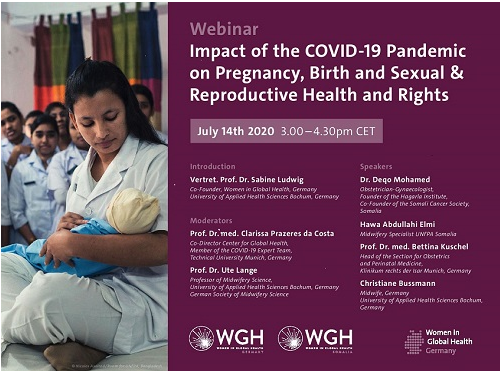
Watch it here
Read it here
Register for future webinars here (Link to follow)
This is first in a series of webinars organized by The Women in Global Health Germany COVID-19 Task Force.
Webinar - The “Triple Dividend”: Investing in Gender Equality within the Global Health Workforce
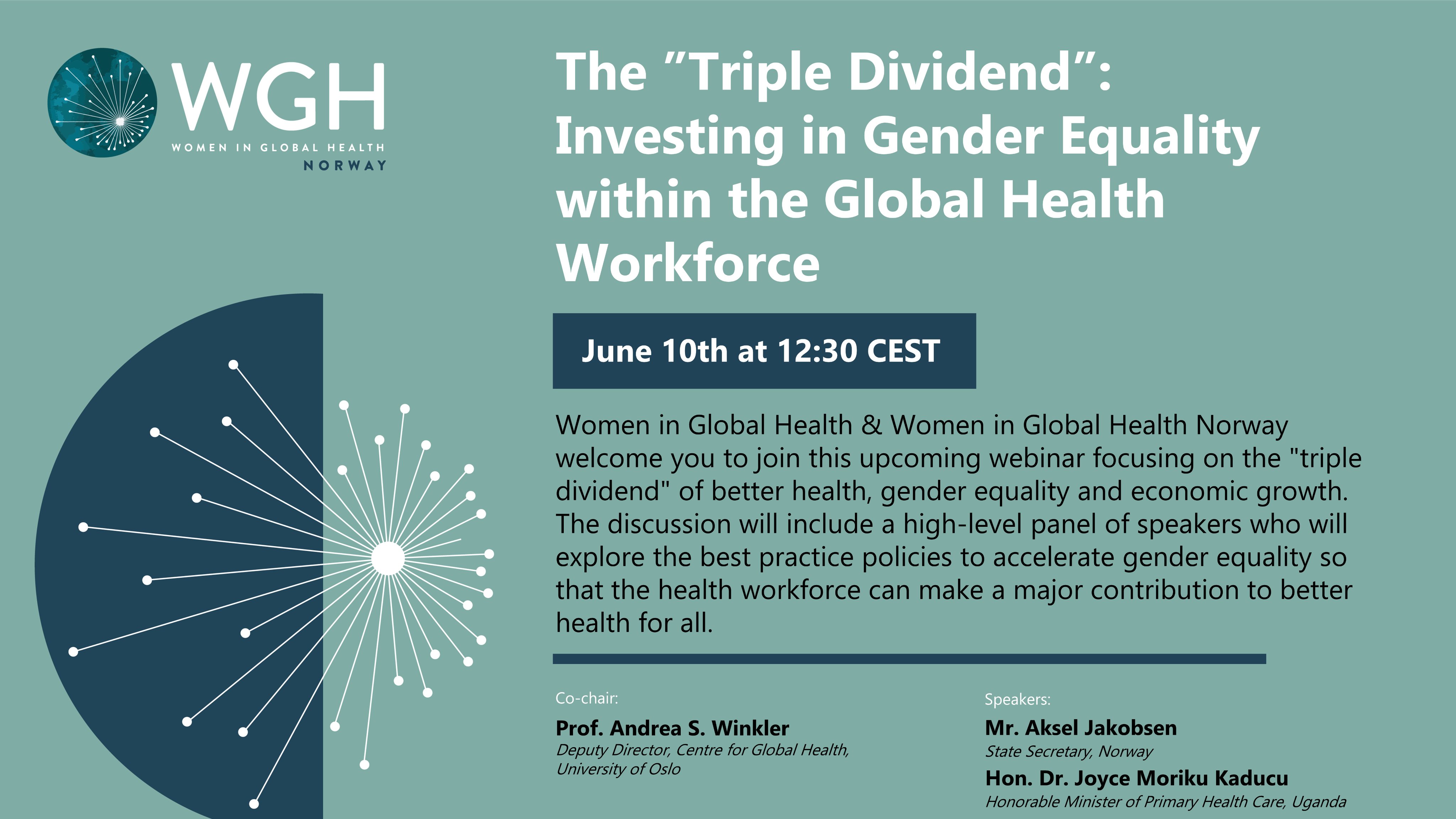
Prof. Andrea Winkler (Founding Director, WGH Norway, Advisor to and Member of WGH Germany) and Prof. Clarissa Prazeres da Costa (Member of WGH Germany) have inspired the establishment of a COVID-19 Task Force across both networks and are, along with the team at CGH, active members of Women in Global Health Germany.
Webinar - The Lancet One Health Commission Webinars
Since the outbreak of COVID-19, The Lancet One Health Commission has conducted a webinar series under the title One Health – Reconnecting for Our Future, covering topics such as the importance of a One Health perspective during pandemics as well as its importance for health security in the future, and which challenges and opportunities young professionals should expect in the field of One Health.
You can register for future webinars here

Or watch the previous ones here
Prof. Andrea Winkler, as co-chair of The Lancet One Health Commission together with Dr. John Amuasi (KCCR, Kumasi, Ghana) is advising the German Federal Ministry of Health (BMG) on their potential One Health approach.
Virtual Discussion - LET ME…talk about it @TUM
As a member of the COVID-19 team of experts at the Klinikum Rechts der Isar, Prof. Clarissa Prazeres da Costa gives us insights into her work and the consequences of the COVID-19 crisis locally and globally.
Listen to the talk here
LET ME… is Medical Humanities Program at TUM to promote a humane perspective for the responsibilities of physicians.
Podcast - Health is Wealth under the Coronavirus
Can we put a price on global health in the time of COVID-19? Mel and Steff from Pod of Gold interview Prof. Clarissa Prazeres da Costa, to discuss the potential fallout of the current pandemic.
Listen to the podcast on Apple or Spotify
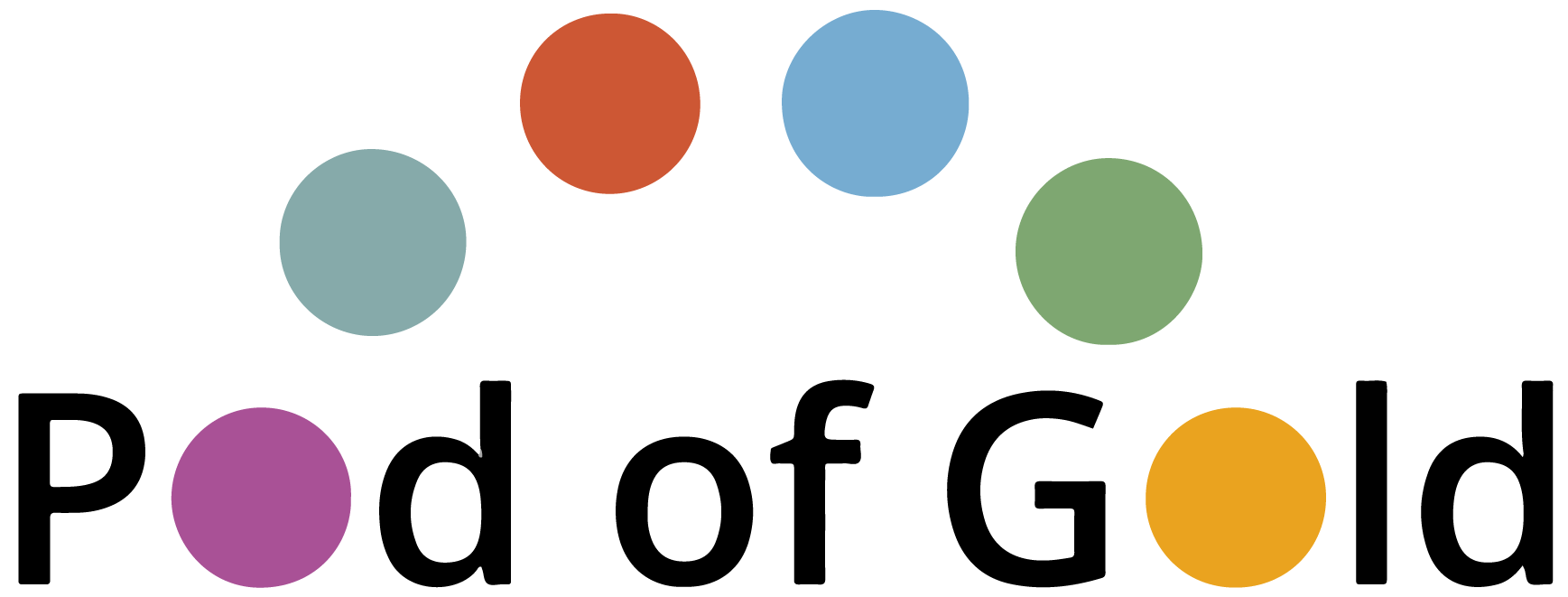

Podcast- The Lancet Digital Health Podcast
Prof Andrea Winkler serves on The Lancet Digital Health’s advisory board and was invited for an interview to discuss the journal’s first anniversary. The journal emphasizes ways in which digital technology can help to solve human challenges, including COVID-19. The Lancet Digital Health’s approach to the potential benefits of technology for healthcare is rooted in science, culture, and ethics. Since its launch, the journal has worked on supporting robust and reproducible digital health research, and uniting researchers and clinicians from different disciplines, helping them to discover, collaborate, and inspire.
Listen to the podcast here (under “The Lancet Digital Health turns One”).
Prof. Winkler is the second speaker.
Video - Information about COVID-19 for African Countries
The Basic Internet Foundation together with the Center for Global Health at University Oslo and our Center for Global Health at TUM (scientific lead for video content Prof. Andrea S. Winkler) produced a Video containing important information about how COVID-19 is spread, what the main symptoms are and what you need to do to protect yourself and your community.
Watch it here
Report - ARD-alpha: Afrika und Corona: Bahnt sich eine Katastrophe an?
Prof. Andrea Winkler is discussing with Tilman Seiler the implications the Covid-19 crisis might have for the African continent.
Watch the report here
Report - ZDF Report on Community Prevention through Masks
In this ZDF Mediathek report our Prof. Clarissa P. da Costa demonstrates the correct way of wearing community masks!
Watch the report here
Skip to 12:00 for the full report
To stay updated with the latest developments concerning COVID-19 follow us on Facebook and Twitter
Projects & Publications
FASZINATION FORSCHUNG
The TUM's Science Magazine offers interesting insights into science and research. In the latest issue, we higlight Prof. Clarissa Prazeres da Costa and her lab team's work on infectious disease research in low and middle income countries. Specifically, we focus on the immune mechnisms of host responses to parasitic worms and its implications for global health research.
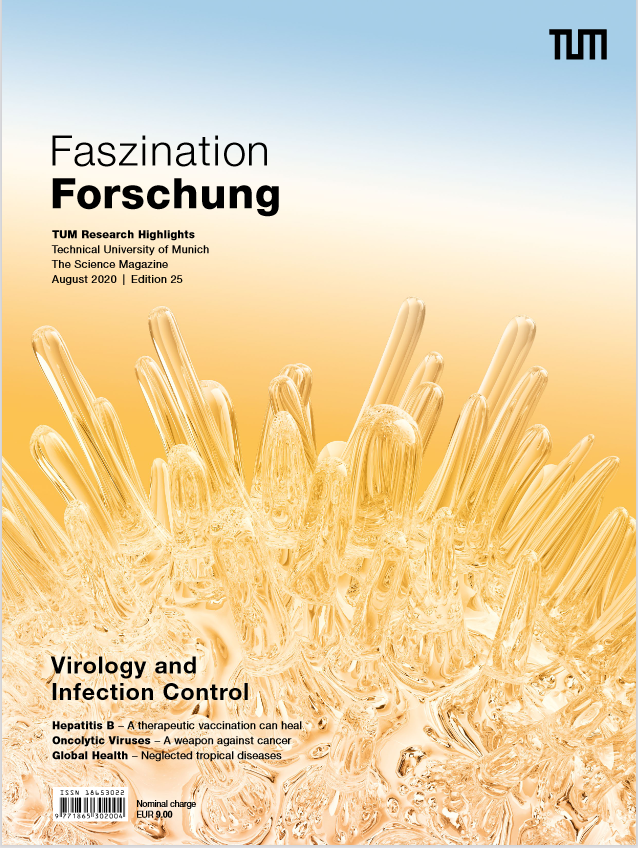
Healthy Lifes for All (german)
Worm infections are widespread in low-income countries. Clarissa Prazeres da Costa investigates how these neglected tropical diseases affect the immune system.
Global Health Needs a Multidisciplinary Approach (german)
"Ensuring healthy lives for all" is one of the United Nations' Sustainable Development Goals. The Center for Global Health at the TUM School of Medicine is addressing these topics.
TUM CHANGE: Science, Reason, Sustanability - Food for Thought for the Post-Corona World
The TUM Emeriti of Excellence published a new book called CHANGE 'Science, Reason, Sustainability - Food for Thought for the Post-Corona World' covering a broad range of topics: politics and society, basic science, technology, IT and connectivity to the African perspective.
We at the CGH have proudly published four articles in this new book on the topic of Global Health on page 216,220,284 and 292. For a brief insights into our articles and/or read the full articles, click here
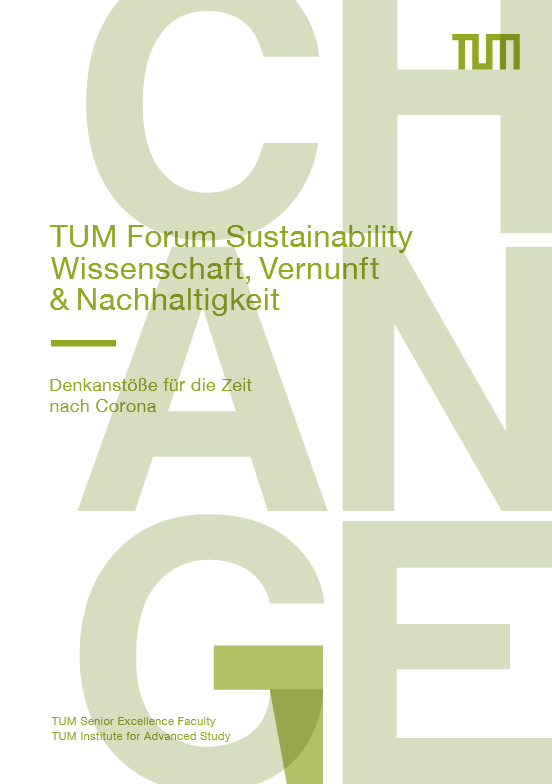
COVID-19 One Health Research Coalition
The call for the establishment of an inclusive and transparent COVID-19 One Health Research Coalition, published in The Lancet, focuses on strengthening linkages with the evolving climate change and planetary health research community in order to contribute to preventing emerging diseases like COVID-19. This call was launched by Prof. Andrea S. Winkler (TUM) and John Amuasi (KNUST) as the Co-Chairs of The Lancet One Health Commission, together with colleagues from the Wildlife Conservation Society and the London School of Hygiene & Tropical Medicine and some others. This multidisciplinary and multilateral coalition aims to guide the research community and research investors towards coordinating and undertaking research at the human–environment–animal interface for the prevention of future pandemics and the creation of a healthy and sustainable future for our planet.
Learn more about the Coalition here
Or read about the launch of The Lancet One Health Commission here
COVID-19 Neuro Coalition
Read more here
Email at covid19.neuro@med.tum.de if you are interested in joining this community.
The Impact of COVID-19 on Refugees in Germany
Since Mid-February, Germany has been testing new migrants for the SARS-Cov-2 and taking precautionary measures for positive cases. However, emerging evidence suggests asylum-seekers and refugees are often not adequately informed about infection hazards and the logistics of social distancing on arrival. The COVID-19 pandemic poses a major challenge for the management of collective accommodation centres for refugees. The often-overcrowded facilities hinder adequate implementation of social distancing and hygiene practices. Satisfactory information dissemination as well as a rapid and efficient management of suspected and confirmed COVID-19 cases are essential. However, scientific evidence on this is largely lacking. Our student, David Kamiab Hesari and Marrium Habib, Co-Coordinator for the CGH - Global Infection Immunology report on the situation.
Read the report here
The Impact of COVID-19 on Academics in Germany & sub-Saharan Africa (SSA)
Emerging evidence suggests that the COVID-19 crisis and its subsequent restrictions is exacerbating pre-existing gender inequities not only for healthcare workers involved in acute crisis management on the frontlines, but also for academics and scientists in research. Females are bearing the brunt with negative research productivity and journal submissions are exhibiting lower women and solo-authored female-led articles. While evidence for the impact of the COVID-19 crisis on women in high-income countries (HICs) is well documented, the impact of women in low-and-middle-income countries, especially Sub-Saharan Africa (SSA), is still understudied. Prof. Clarissa da Costa, Co-Director CGH and Marrium Habib, Co-coordinator at CGH, have pioneered an effort to capture the impact of the COVID-19 crisis on academics professional output in Germany and SSA. A brief questionnaire was circulated amongst male and female research scientists and academics hailing from Germany and eight SSA countries to capture meaningful data on the impact of this pandemic on their work-life balance, productivity and research output.
Read more here (Link to follow)
This is part of the ongoing Women’s Health Working Group Initiative (WHWG) led by Prof. Clarissa Prazeres da Costa and Marrium Habib
The Global SOLIDARITY Trial & the Focality of the WHO
The crisis management and politicization of the World Health Organization (WHO) secretariat during the COVID-19 pandemic raises questions about its relevance in global health politics. Dr. Clarissa Prazeres da Costa teams up with Prof. Eugénia da Conceição-Heldt & Prof. Janina Steinert at the TUM School of Governance, Dr. Martin Schlegel, Klinikum Rechts der Isar and Dr. Andreas Ullrich, Charité Medical University to investigate whether the WHO is able to regain focality with its innovative approach of the a worldwide clinical megatrial, known as the SOLIDARITY trial. This research project will assess in detail the processes leading to the emergence, dynamics, institutional design (governance structure), and implementation of this new megatrial initiative through expert interviews with officials from the WHO, national health ministries, research institutions participating in the trial, pharmaceutical companies and philanthropic actors involved. The results of this study will enable an assessment of if the WHO was able to regain focality and to provide a global public good through the SOLIDARITY trial as a blueprint for future public health responses.
Learn more here
Novel & Sustainable PAW-V Technology Against COVID-19
Prof. Clarissa Prazeres da Costa, Dr. Nina Wantina, Technical University Munich, School of Medicine, Institute for Medical Microbiology, Immunology and Hygiene (MIH), Center for Global Health, Trogerstr. 30, 81675 München; email: clarissa.dacosta@tum.de
Prof. Petra Mela, Fabien Jodeit, Technical University of Munich, Chair of Medical Materials and Implants (MMI), Department of Mechanical Engineering and Munich School of BioEngineering; Boltzmannstrasse 15, 85748 Garching; email: petra.mela@tum.de
Resource and Information Hub for COVID-19
Women in Global Health Germany
The team at CGH are active members of the WGH, Germany and the Co-Directors advise the WGH Germany COVID-19 Task Force and engage in COVID-19 and gender issues across the global platform; writing opinion pieces, organising webinars and participating in scientific and political discussions centred around COVID-19.
Read the statement here (German)
Read about COVID 50/50 here
Read the five ‘ASKs’ for global health security here
Lancet One Health Commission
The ambition of The Lancet One Health Commission is to offer a recalibrated understanding of the ways in which contemporary global health challenges are implicated within the complex interconnectedness of humans, animals, and our shared environment, and to provide an approach for harnessing this knowledge to ensure a sustainable healthy future.
Learn more here
Or read an article in The Lancet here
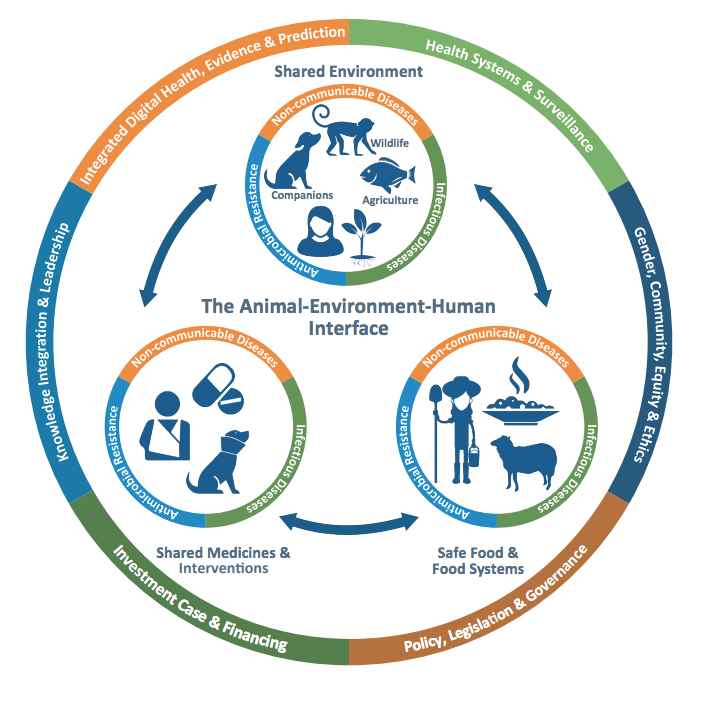
Geneva Health Forum 2020
The Geneva Health Forum (GHF) is the forum of innovative practices in Global Health. Created in 2006 by the Geneva University Hospitals (HUG) and the Faculty of Medicine of the University of Geneva. It is one of the most important international conferences on Global Health, with crucial global health actors such as the WHO, establishing key partnerships
Register here
World Health Summit Berlin 2020
The World Health Summit is one of the world’s leading strategic forums for global health which brings together leaders from politics, science and medicine, the private sector, and civil society to set the agenda for a healthier future. In this very special year of the COVID-19 pandemic, the World Health Summit will take place as an on-site conference in Berlin and at the same time as a fully digital, interactive conference with cost-free availability of all sessions of the program
Read more here
WHO Global Solidarity Trial
Globally, the more than five million cases of COVID-19 have wreaked havoc on families, societies and economies. In this critical time, the WHO has stepped up to address this momentous health crisis with the SOLIDARITY Clinical Trial to find a cure for Covid19. The SOLIDARITY trial brings together a global research consortium under the umbrella of the WHO to test the four most promising possible treatment options.
Stay updated here
73rd World Health Assembly
The first-ever virtual world health assembly convened on 18-19 May 2020 focusing on strengthening multilateral cooperation in response to the COVID-19 pandemic. The impact on sub-Saharan African countries can only be cushioned by equitable access to diagnostics, therapeutics and vaccines to combat the virus.
Read our summaries here
